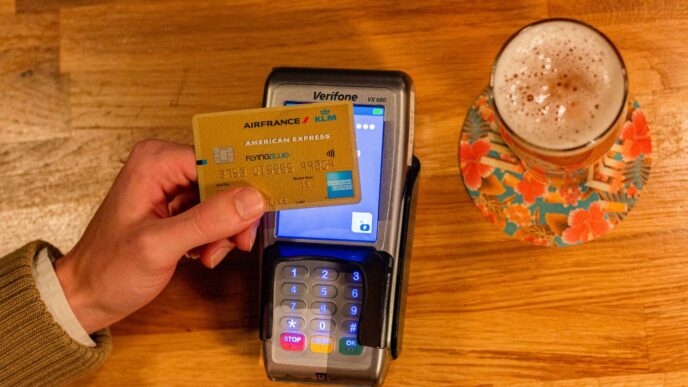Money2020 Las Vegas 2024 just wrapped up, and wow, it was a lot to take in. The big theme this year was ‘Human X Machine,’ which basically means figuring out how people and technology can work together best in the money world. Think AI, but with humans still in the loop. Lots of talk about making payments faster, keeping things safe from fraud, and making banking feel more like, well, *you*. It was a packed few days with thousands of people from banks, tech companies, and startups all trying to figure out what’s next. Here are some of the main things that stood out from Money2020 Las Vegas 2024.
Key Takeaways
- AI is changing finance, but people are still needed. While AI can handle a lot of the boring, repetitive tasks in areas like compliance and fraud checks, humans need to be there to make sure it’s all working right and fairly. It’s about AI helping us out, not replacing us entirely.
- Old tech needs an upgrade. Many companies are still using older systems for things like compliance and fighting financial crime. The conference showed that these systems need a serious update to keep up with new kinds of fraud and faster payments.
- Banking is getting more personal. The idea of ‘lifestyle banking’ is big. This means banks want to offer services tailored just for you, using your data to suggest things you might like, and making it easy to manage your money on the go, maybe even with some fun rewards.
- Open banking in the US is still a work in progress. While the idea of sharing your financial data easily to get better services sounds good, there are big worries about privacy and security. It’s moving forward, but slowly, with lots of questions about rules and safety.
- Real-time payments are becoming the norm. Moving money instantly is a major focus. There’s a lot of development in making payment networks faster and making sure they’re secure and compliant, which is great news for businesses and individuals who want quick transactions.
Money2020 Las Vegas 2024: Human X Machine Theme
This year’s Money20/20 in Las Vegas really zeroed in on the “Human X Machine” theme. It wasn’t just a catchy slogan; it felt like the core idea driving a lot of the conversations. We saw thousands of people from all corners of finance – banks, tech folks, startups, you name it – all trying to figure out how we work with technology, not just use it. The big question everyone seemed to be wrestling with is how to blend human smarts with machine power to make financial services better.
Evolving Relationship Between Technology and Human Ingenuity
It’s clear that technology, especially AI, is moving fast. But the consensus at the conference was that it’s not about replacing people. Instead, it’s about giving people better tools. Think about it: AI can sift through mountains of data way faster than any human. But it’s the human who understands the context, the nuance, and the ethical implications. We heard a lot about how AI can automate the grunt work in areas like compliance, flagging potential issues. But a human still needs to make the final call, especially when regulators are watching closely. It’s like having a super-smart assistant who does all the legwork, but you’re still the one in charge.
AI, Compliance, and Embedded Finance
AI popped up everywhere, especially in discussions about compliance. A lot of companies are already using AI, with reports showing a big jump in AI initiatives across financial services. For compliance, AI can speed things up dramatically. For instance, one fintech shared that AI reduced their need for human review on initial alerts to less than 1%. That’s huge for efficiency. But the key takeaway? AI in compliance needs a human in the loop. Regulators want to understand how decisions are made, so those ‘black box’ AI systems are a no-go. We also talked about how AI can help spot inconsistencies between company policies and new rules. It’s all about making compliance smarter, not just faster.
Real-Time Payments and Regulatory Environment
With faster payments becoming the norm, keeping up with regulations is a constant challenge. The speed of transactions means that financial crime prevention needs to be just as quick. This is where the Human X Machine theme really comes into play. AI can help detect fraud in real-time, but human expertise is needed to refine those systems and handle complex cases. The regulatory environment is also a big piece of this puzzle. As new technologies emerge, regulators are working to keep pace, and the conference highlighted the ongoing dialogue between innovators and regulators to create a framework that supports both progress and safety. It’s a balancing act, for sure.
AI’s Transformative Role in Financial Services
Artificial intelligence wasn’t just a buzzword at Money20/20 Las Vegas this year; it felt like the engine driving a lot of the conversations. It’s pretty wild to think that 76% of financial services companies are already using AI in some way, with a big chunk of that going into generative AI. That’s a huge shift for an industry that’s usually a bit slow on the uptake with new tech.
Panels kept circling back to how AI can make things run smoother, make customer interactions feel more personal, and seriously beef up how we catch fraudsters. But it’s not all about just plugging in AI and walking away. A lot of smart people stressed that we need to be careful. Using AI responsibly and ethically is key to keeping customers’ trust. It’s a balancing act, really, figuring out how to mix AI smarts with the human touch to make things work better for everyone.
Integrating AI in Compliance with Human Oversight
This was a big one. Everyone agreed that AI can totally take over the repetitive compliance tasks, which is great for cutting down on manual work. Think about screening alerts – AI can handle a lot of the initial checks, so humans only need to step in for the trickier stuff. One fintech mentioned that AI reduced their Level 1 alerts needing human review to less than 1%. That’s a massive time saver. But, and this is a big ‘but’, nobody thinks AI should completely replace human judgment. Regulators want to know how decisions are made, so we can’t have ‘black box’ AI systems. AI is a tool to help compliance officers, not a replacement for them. It’s about making their jobs easier and more effective, not automating them out of existence.
Responsible and Ethical AI Applications
We’re talking about building trust here, right? AI is changing how banks and financial companies connect with their customers. It’s helping create those personalized experiences people want, but without messing with their privacy. Things like using biometrics to verify who you are, or using blockchain for secure checks, are becoming more common. The tricky part is making sure AI doesn’t accidentally create new problems, like unfair biases in its decisions. It’s a constant effort to make sure the AI we use is fair, transparent, and actually helps people, rather than creating more headaches.
AI-Assisted Fraud Detection and Prevention
Fraud was another hot topic, especially with AI making it easier for fraudsters to get creative. The challenge is that everyone’s spending habits are different. One person might buy one big thing a year, while another uses their card for small things every day. AI is helping by looking at the context of a transaction. If you suddenly buy something while you’re on vacation in a new country, AI can flag that as potentially suspicious, but it’s less likely to be a false alarm if it knows your usual travel patterns. This means fewer annoying interruptions for legitimate customers. The goal is to catch the bad guys without making life difficult for the good guys. It’s all about creating smarter, more personalized ways to spot fraud before it causes real damage.
Innovations in Compliance and Financial Crime Prevention
This year’s Money2020 in Las Vegas really hammered home how much things are changing in the world of financial compliance and stopping bad actors. It’s not just about ticking boxes anymore; it’s about staying ahead of some pretty clever criminals and a constantly shifting set of rules.
Upgrading Legacy Compliance Solutions
Lots of talk revolved around how many financial outfits are still using older systems that just can’t keep up. Think of it like trying to run the latest video game on a computer from ten years ago – it’s just not going to work well. For big banks, swapping out these old systems is a huge undertaking, requiring a lot of time and money. Fintechs, on the other hand, sometimes just patch things together as they go, which can cause bigger headaches down the road. The general feeling was that we need smarter, more modern tools to handle today’s financial world.
Combating Financial Crime Through Collaboration
Nobody seems to be able to fight financial crime alone these days. It was clear that working together is the name of the game. This means banks, fintechs, and even regulators need to share information and strategies. Fraudsters are getting smarter, using things like AI themselves, so we need to be just as smart, if not smarter.
- Sharing threat intelligence in real-time.
- Developing common standards for data sharing.
- Joint efforts in developing new detection methods.
Personalized Fraud Detection Strategies
One size fits all doesn’t work for fraud prevention anymore. With so many new ways to pay and interact financially, fraudsters are finding new angles. We heard a lot about needing to look beyond just transaction data.
- Synthetic identity fraud is a growing concern, requiring deeper checks on who people really are.
- Using AI to spot unusual patterns that might signal fraud, but with humans still in the loop to make the final call.
- Tailoring fraud detection to specific customer behaviors and transaction types.
The Rise of Lifestyle Banking and Personalized Experiences

It feels like everywhere you look these days, companies are talking about personalization. And at Money20/20, it was clear that the financial world is no different. We’re moving beyond just offering accounts and loans; banks and fintechs are really trying to become part of our everyday lives. This is what they’re calling ‘lifestyle banking’.
Customized Customer Experiences and Data-Driven Cross-Sales
Think about it – your bank should know you, right? Not in a creepy way, but in a helpful way. Lifestyle banking is all about using the information you share (and sometimes, the information they can gather) to make your financial life easier and more relevant. This means tailoring offers, advice, and even the way you interact with your bank. The goal is to make banking feel less like a chore and more like a helpful assistant. For example, if you’re saving for a down payment on a house, your bank might offer tips on budgeting or connect you with mortgage lenders, all within the same app. It’s about anticipating needs before you even realize them.
Gamification and Loyalty Programs
Who doesn’t like a little fun? Gamification is popping up everywhere, and finance is no exception. We’re seeing banks and fintechs use game-like features – think points, badges, leaderboards – to encourage good financial habits. Saving money, paying bills on time, or even learning about investing can become more engaging when there’s a reward or a challenge involved. Loyalty programs are also getting a makeover, moving beyond simple cashback to offer more unique perks that align with a customer’s lifestyle. It’s a smart way to keep customers engaged and feeling appreciated.
Instant Digital Account Opening and Real-Time Money Management
Nobody wants to spend hours filling out paperwork just to open a bank account. The push is on for instant, digital account opening. You can often do it all from your phone in just a few minutes. Once your account is open, managing your money needs to be just as easy. This includes things like:
- Real-time transaction alerts so you always know what’s happening.
- Easy-to-understand spending breakdowns to see where your money is going.
- Tools for setting budgets and tracking savings goals with visual progress.
- Quick access to features like instant payments and short-term loans when needed.
It’s all about giving people control and visibility over their finances in the moment, making money management feel less abstract and more actionable.
Open Banking: Progress and Hurdles in the US
Open banking has been a hot topic, and it’s easy to see why. The idea of letting people easily share their financial info to make things like buying stuff online or opening a new loan simpler sounds pretty good, right? Especially with the CFPB’s recent rule about giving consumers more control over their financial data. It feels like a big step towards better customer experiences.
But, it’s not all smooth sailing. We’re talking about really sensitive information here, so privacy and security are huge concerns. Nobody wants their financial details getting out there by mistake. This means banks and consumers are understandably a bit hesitant to jump in headfirst. Plus, any changes to financial data rights just add another layer of complexity to the whole picture.
Consumer Data Sharing and Improved Customer Experiences
The promise of open banking is that it can really shake things up for the better when it comes to customer experiences. Imagine applying for a mortgage and not having to dig up old statements because your new bank can securely access them with your permission. Or getting personalized financial advice based on a complete view of your accounts, not just the ones at that particular bank. This kind of data sharing, when done right, could lead to:
- Faster and more streamlined account opening processes.
- More accurate and personalized financial product recommendations.
- Easier budgeting and financial management tools that pull data from all your accounts.
Privacy, Security, and Regulatory Concerns
This is where things get tricky. Sharing financial data isn’t like sharing your favorite recipe. It’s highly personal and sensitive. So, the big questions are:
- How do we make sure this data is protected from breaches and misuse?
- What are the exact rules and regulations that need to be followed, and how do they keep up with the technology?
- Who is ultimately responsible if something goes wrong?
These aren’t small questions, and the answers will shape how comfortable people are with open banking. The industry is still figuring out the best way to balance innovation with robust protection.
Impact of Financial Data Rights on Open Banking
Financial data rights are a big piece of the puzzle. When consumers have more say over their data, it directly impacts how open banking can develop. It means that any progress in open banking has to align with these rights, which can sometimes slow things down. It’s a bit of a balancing act, trying to give people access to their data while also making sure they have control and that the system is secure. The conversation around these rights is ongoing and will definitely influence the future of open banking in the US.
Real-Time Payments and the Future of Transactions
The buzz around real-time payments at Money20/20 was undeniable. It’s not just about moving money faster; it’s about a fundamental shift in how transactions work, offering more control and immediate access. Think about it: no more waiting days for a payment to clear. This is a big deal for everyone, from individuals to large corporations. The push for 24/7 financial capabilities is reshaping the entire payments landscape.
Innovations in Faster Payments Networks
We saw a lot of discussion about the technology powering these instant transactions. The goal is to make these networks more robust and widespread. It’s about building the infrastructure that can handle the volume and speed required for a modern economy. This includes exploring new ways to connect different payment systems so money can flow freely and instantly, no matter where it’s going.
Enhanced Compliance Frameworks for Instant Payments
Of course, with speed comes the need for security and compliance. It’s not enough for payments to be fast; they have to be safe and follow the rules. This means developing smarter ways to check transactions as they happen. AI is playing a big role here, helping to spot suspicious activity without slowing things down. It’s a balancing act, making sure that innovation doesn’t outpace our ability to keep things secure and compliant. This is especially important as new regulations come into play, like those giving consumers more control over their financial data.
Corporate Treasurer Benefits from Instant Payments
For businesses, especially corporate treasurers, real-time payments are a game-changer. Imagine having complete visibility and control over your cash flow, right now. This allows for much better financial planning and quicker responses to market changes. It means companies can manage disbursements and incoming funds with unprecedented precision. The NYSE even extending its trading hours highlights the growing need for financial services that operate around the clock, and instant payments are a big part of that. This move towards instant transactions is a key part of the future of banking and payments convergence.
Networking and Partnership Opportunities at Money2020

Money20/20 Las Vegas isn’t just about the talks and the tech demos, though there’s plenty of that. A huge part of why people show up, year after year, is the chance to actually connect with others in the financial world. It’s where you can move past just reading about trends and actually talk strategy with the people making them happen. Think of it as a giant, concentrated hub for deal-making and relationship building.
Accelerating Deals and Supercharging Deal Flow
This event is set up to help you get business done. It’s not just about bumping into someone in the hallway, though that happens too. There are structured ways to meet people and dedicated spaces designed for business discussions. The goal is to make it easier to find the right people and speed up the process of making deals. You’ll find a lot of senior folks here, all looking to move things forward.
Building and Growing Strategic Partnerships
Beyond just closing a single deal, Money20/20 is a prime spot for forging longer-term relationships. You can meet potential collaborators, discuss joint ventures, or find companies that complement your own services. It’s about finding those strategic fits that can help both parties grow. Many conversations that start at the event can lead to significant partnerships down the line.
Connecting with Industry Peers and Potential Collaborations
It’s a place where you can really get a feel for what’s happening across the industry. You can chat with peers, see what challenges they’re facing, and share your own insights. This kind of open exchange often sparks new ideas and potential collaborations you might not have considered otherwise. The sheer number of different companies and roles represented means there’s a good chance you’ll find someone with a shared interest or a complementary skill set. It’s a good idea to go in with a list of who you’d like to meet, but also be open to unexpected conversations. You never know where the next big idea or partnership will come from.
Wrapping Up: What’s Next for Money?
So, Money20/20 Las Vegas 2024 wrapped up, and it was a lot to take in. We saw a huge focus on how AI is changing things, but it’s clear that people are still needed to make sure it’s all working right and fairly. Plus, everyone’s talking about making banking more like a lifestyle, with personalized stuff and easy-to-use platforms. It feels like the future is all about blending smart tech with a human touch. It’s exciting to think about what new products and services will pop up because of all these ideas. We’ll definitely be keeping an eye on how these trends play out in the coming year.
Frequently Asked Questions
What was the main theme of Money20/20 Las Vegas 2024?
The big idea at Money20/20 Las Vegas 2024 was ‘Human X Machine.’ This means thinking about how technology, like AI, works together with people’s smart ideas and skills to make financial services better.
How is Artificial Intelligence (AI) changing banking and money services?
AI is helping in many ways! It can make checking if things are following the rules faster, help catch scams, and even make customer service more personal. But, people still need to be in charge to make sure AI is used the right way and fairly.
What’s new with real-time payments?
Real-time payments, where money moves instantly, are becoming more common. There are new ways to make these payments even faster and safer. This is great for businesses because their treasurers can manage money much better.
What is ‘lifestyle banking’?
Lifestyle banking is all about making banking fit into your life. It means banks offering special deals just for you, making it easy to open accounts super fast, and helping you manage your money on the go, almost like a personal assistant.
Is Open Banking happening in the U.S.?
People are talking a lot about Open Banking in the U.S., where you can easily share your financial information to get better services. But, there are still worries about keeping your data safe and private, and figuring out all the rules.
Why is networking important at events like Money20/20?
Meeting and talking with other people at these events is super important. It helps people make deals, find new partners to work with, and share ideas. It’s not just about the talks; it’s about building connections that help the whole money world move forward.














